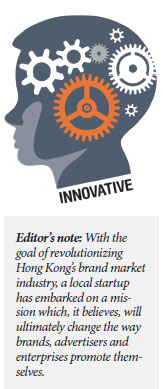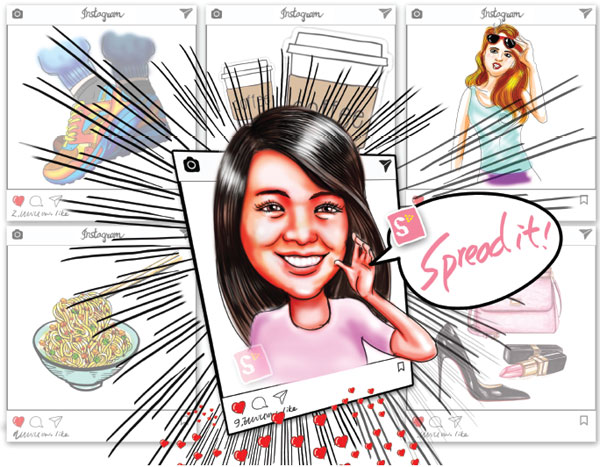Brand micro-influencers roar off to a heady start
Updated: 2018-05-25 06:18
By Sun Feier in Hong Kong(HK Edition)
|
|||||||
With the influencer marketing business having picked up headily in the past few years, and internet giants on the Chinese mainland taking a voracious lead in the field, a Hong Kong micro-influencer startup has jumped to the fore, giving the city's brand marketing system a shot in the arm.
Timothy Ng, co-founder of the startup Spread-it, believes the company could change the way brands, advertisers and enterprises promote themselves. Along with fellow founder Winnie Lee, he says they've managed to link up their big-name clients, including Microsoft, Topshop and McDonald's, with university students in assembling some 2,000 people to harp on one particular brand during each marketing campaign.
Launched in 2016, the platform has gathered more than 10,000 micro-influencers who're willing to create creative posts with publicity value. Before becoming contributors, they would receive products sent by brand owners who want to raise their profile and influence, with the goal of attaining a sustainable marketing objective through these amateur key opinion leaders (KOLs).

The participants' salaries are decided by an evaluation mechanism in a bid to assess their profile quality and factors like the number of followers and the quality of engagement. After a campaign, the contributors can cash out with their electronic wallet Paypal, and payments can range from tens to thousands of dollars, according to Lee.
"Different from other KOL agencies, our platform encourages micro-influencers to produce posts they're really interested in and have recommended," says Ng. "Most of the agencies offer high salaries to attract contributors, which could distort recommendations."
Among the more than 200 brands Spread-it has promoted, cosmetics products providers and fashion companies are the most popular for these influencers on Instagram, where they can upload photographs and short videos, follow other users' feeds and geotag images with the name of a location.
Spread-it's website displays four KOL stories with various brands. Cosmetic lover @lovestoryhk shared her experience concerning a new makeup product from Clinique that has drawn more than 1,600 "likes" on a single post. The others have generated in excess of 100 "average likes" per post.
Ng and Lee had struck up an entrepreneurial chord dating back to their college days. Ng is a graduate of the Hong Kong University of Science and Technology majoring in global business and economics, while Lee studied international business and majored in Chinese enterprise at the Chinese University of Hong Kong.
Before launching Spread-it, the two young entrepreneurs had tried out many business projects while still at college. Initially, they would hire students to help distribute leaflets, dispatch gifts to people who scan QR codes and even run errands in order to support their first commercial experiment.
Their systematic entrepreneurship began with an online platform that provides a free postcard delivery service for the public. "Many years ago, we were over the moon when we received an email. But now, it's just a mere surprise when we do get a postcard," quips Ng.
"Our aim is to change some unresolved social issues," explains Lee. She recalls that since the team took the plunge into entrepreneurship four years ago, they've been fettered by unpractical business models and immature profits many times. But, they've finally found a win-win model with which they can make a difference in the brand marketing process.
Spread-it admits it hasn't been under pressure to raise funds to date, thanks to its precision marketing strategy. But, when it comes to decision making and experience, it does matter.
"No one else can offer you more incisive comments than those who are experienced," says Lee. "You can only make your own decision and, if it goes off the track, you've to bear all the costs."
Some people believe the sooner you start your own business the better, while others see the trial-and-error cost in Hong Kong as too high for them to take the plunge.
As a student entrepreneur, Lee believes ignorance is the "treasured asset" of young people, just like the saying "those who know nothing fear nothing" and this prods them to move forward unhesitatingly.
In Hong Kong, universities have been organizing more startup fairs, enterprise fests and business planning contests in recent years to support and encourage student entrepreneurs. Government-initiated innovative digital communities like Cyberport offer value-added services aimed at nurturing youths, startups and entrepreneurs, which have succeeded in luring a growing number of participants.
"From my own experience, the most important thing for business novices is to be able to identify potential, able and aspiring partners, investors and employees, and this calls for reaching out to different classes of people," Lee suggests.
Ng hopes that peers could "fail fast and try fast" rather than organizing one project or launching one product for just one year as a particular market might not last.
Spear-it's ultimate aim to revolutionize the marketing regime in Hong Kong or even the much-touted Guangdong-Hong Kong-Macao Greater Bay Area.
Ng acknowledges that the mainland's marketing industry is one step ahead of Hong Kong's as it practices a sophisticated system to achieve precision marketing. Their future system is geared to allowing Hong Kong brands, advertisers and enterprises to promote their products according to users' preferences.
"However, the availability of data is still the biggest challenge for our team," he adds.
joycesun@chinadailyhk.com

(HK Edition 05/25/2018 page5)